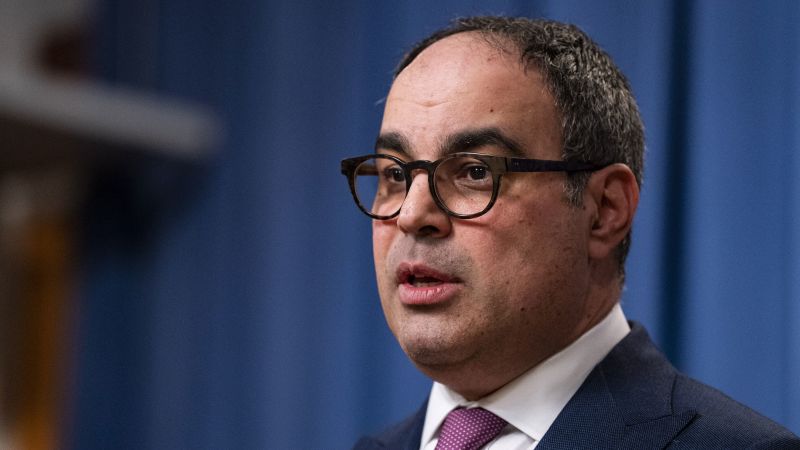Google went on the offensive Thursday in a closely watched antitrust case dealing with the tech giant’s digital advertising dominance, questioning the motives of the Justice Department’s top antitrust official.
Google’s filing targets Jonathan Kanter, the US assistant attorney general for antitrust, and his widely reported past legal representation of Google-parent Alphabet’s corporate rivals, such as Microsoft, Yelp and News Corp, among others. Google’s attorneys argue that Kanter’s past clients create an ethical conflict and should raise doubts about the US government’s overall lawsuit.
In the filing to the US District Court in Alexandria, Virginia, Google lawyers cited years of advocacy by Kanter on behalf of his clients that were opposed to Google, as well as public remarks he has made in the past that Google said were evidence of bias. They also cited evidence in the case that, prior to joining DOJ, Kanter lobbied in a personal capacity for the agency to pursue an antitrust case against Google.
Kanter, the filing alleged, “is using public office to accomplish what he was unable to do in private practice on behalf of his paying clients.”
The Justice Department declined to comment on the filing.
Google’s allegations seek to reframe the DOJ’s suit from a cut-and-dry application of antitrust law by career DOJ staff into something more akin to a personal vendetta led by a single powerful individual and his ideological allies.
If it works, the effort could bolster Google’s claims in the case that the lawsuit violates the company’s due process rights and that the US government is selectively enforcing the law.
When Kanter was appointed to lead the DOJ’s antitrust division, he signed an ethics pledge that effectively prevented him from getting involved in the case, the filing said, adding that “as soon as AAG Kanter was ‘cleared’ to lead the matter, a complaint was prepared that asserted the same antitrust theories that AAG Kanter had been paid to press for years on behalf of his private practice clients.”
Google also accused Kanter in the filing of surrounding himself at DOJ with others who may have a bias against the company, including the Stanford economist and artificial intelligence expert Susan Athey, who previously worked for Microsoft and was named chief economist of the DOJ’s antitrust division last year. The filing also cites evidence in the case showing that Kanter and Athey had contacted DOJ in 2020 pitching an anti-Google presentation the two had made, volunteering to deliver the presentation in a personal capacity and “not for any specific client.”
Google argued in the filing that the court should permit the company to conduct additional fact-finding that might yield further evidence about Kanter’s impartiality. There are a number of pending discovery requests, the filing said, that could show how Kanter’s role in bringing the case may have been “inappropriately infected” by the earlier events of his career.
The filing reflects an ongoing dispute between Google and the US government over the extent of discovery in the case, which was brought by the Biden administration in January. The case calls for Google’s ad tech business to be broken up. It is the second major antitrust suit the US government has leveled at Google, after the Trump administration sued the company in 2020 over alleged antitrust violations linked to Google’s search business. That high-stakes case heads to trial next month.
The Biden administration has sought to limit the scope of discovery to prevent Google from gathering evidence about Kanter’s advocacy, according to Thursday’s filing. According to the US government’s motion earlier this month, the DOJ sought to restrict discovery from “any party or non-party” related to Google’s claims about due process or selective enforcement.
In a memo to the court accompanying the Aug. 18 motion, DOJ argued that Google’s discovery requests were “unusual, invasive, and irrelevant,” and accused Google of trying to distract from its alleged “monopolization scheme” with frivolous defenses.
“Any suggestion that the instant lawsuit was motivated by bias rather than the facts of Google’s own conduct is belied by the fact that the United States’ investigation of Google’s conduct has spanned the tenure of two Assistant Attorneys General, appointed in 2017 and 2021 respectively, as well as two Acting Assistant Attorney Generals,” the DOJ memo said. It added that dozens of career prosecutors have been involved in the case from the beginning, and that Google can hardly claim to have been singled out when other antitrust regulators around the world have applied similar scrutiny to the tech giant.
Should the US District Court for the Eastern District of Virginia side with Google in the dispute, it could lead to more information entering the record that might sway the jury eventually assigned to the case.
Google’s lawyers previously asked US District Judge Leonie Brinkema to transfer the lawsuit to Manhattan where some other antitrust cases are pending.
Judge Brinkema declined that request in March, keeping the case in Virginia.
Read the full article here




